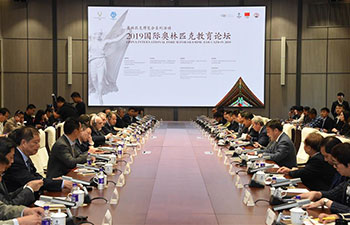by Ronald Ssekandi
MBARARA, Uganda, May 5 (Xinhua)-- A mobile application, developed to help diagnose diseases in babies and currently under a pilot study, is helping midwives save newborn babies and mothers in the western Ugandan district of Mbarara.
Trifonia Atukunda, a midwife at Bwizibwera Health Center IV, has been using the application Protecting Infants Remotely by SMS (PRISMS) to quickly seek advice in the physical absence of a specialist like a gynecologist or pediatrician.
"It is very helpful especially when you do not know exactly what to do with the baby who has a complication," Atukunda told Xinhua in an interview on Sunday at the health center.
"We were referring all babies to Mbarara Regional Referral Hospital but now all our babies are managed from here. We only refer when the application advises otherwise," she added.
Bwizibwera Health Center IV figures show that more than 100 mothers deliver at the facility per month. Some babies, according to Atukunda, are in good health while others have complications and need further management.
The PRISMS application was developed by a consortium of health researchers from Mbarara University of Science and Technology, a few kilometers away from Bwizibwera Health Center IV.
The researchers under their organization CAMtech, developed the application in view of the limited number of medical specialists especially in remote areas.
Peter Ssebutinde, district health officer of Mbarara who was involved in giving technical advice in the development of the application, said the district needed a quick solution to stop the death of babies and mothers shortly after birth.
Ssebutinde said when a midwife gets a baby who has a complication, like not breathing well, poor breast feeding or underweight, she feeds the data into the application downloaded on her smart phone.
"The application works in a way that once these symptoms and signs are fed into the application, it gives an immediate response to the midwife, giving her a plan of action," Ssebutinde said.
Depending on the plan of action, the midwife can make a decision whether to treat the baby or refer it to a higher health facility, he said.
As a result of this application, there has been a 30-percent reduction in neonatal deaths and 25-percent reduction in maternal mortality rate at the health center, according to him.
Ssebutinde said that these positive results should be able to inform policymakers to scale up the use of the application countrywide, especially as government strives to reduce maternal mortality rate from 336 deaths per 100,000 live births to less than 70 deaths per 100,000 live births by 2030.
Joyce Moriku Kaducu, minister of state for health in charge of primary health care, told Xinhua in an interview that the Ugandan government welcomes all innovations that are aimed at improving healthcare service.
"Innovation is very important, it is the way to go. We encourage scientists if they can come up with innovations in monitoring the mother and baby during and after pregnancy," Kaducu said.
She said that she is waiting for a brief about the PRISMS application so that the government can make a decision on how to scale it up across the east African country.












